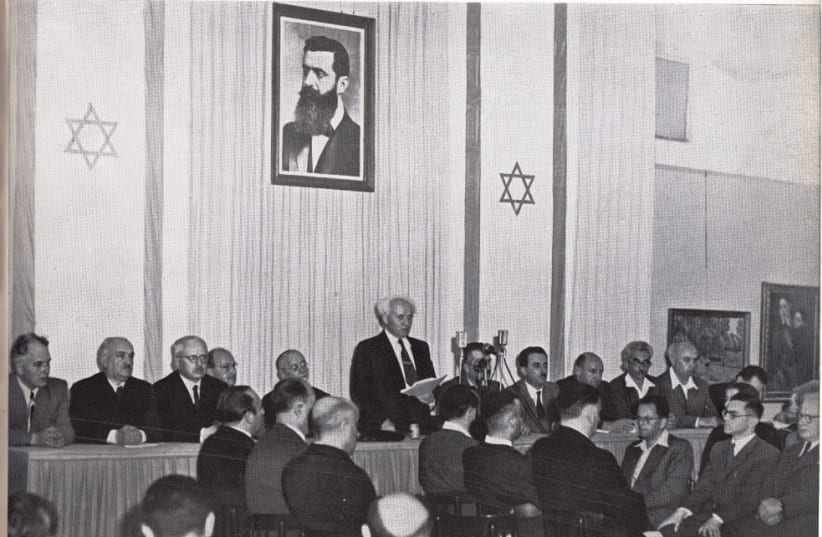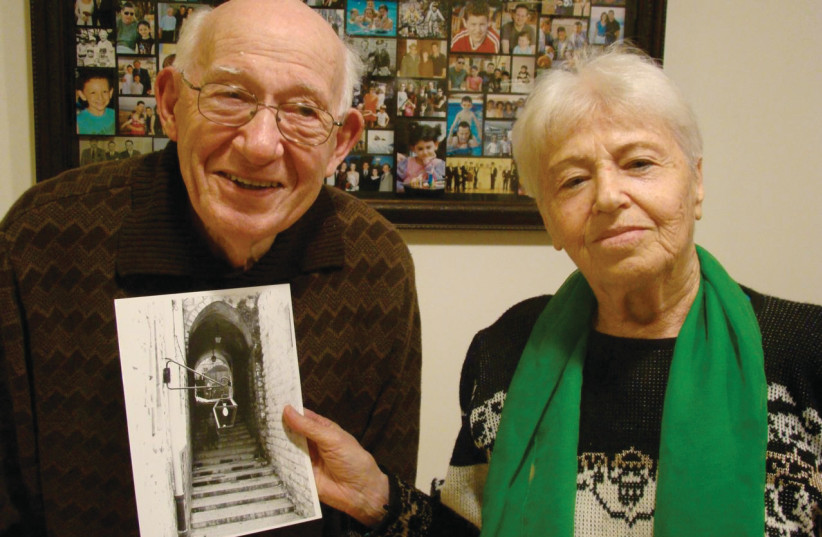‘I remember the railroad car where I stayed for 24 hours in Stanislaw, Russia, without getting up from my spot; how I rolled under the engine without documents; how I crossed the Alps on foot, and more and more.
“They all embody a long chain of pain, troubles, and suffering without knowing the dangers enmeshed in each,” Dov Levin wrote movingly in his diary. “There is a time when I benefit from ‘the Land of Israel is acquired through suffering.’ My suffering for it is dear to me, my illegal immigration, and ever more so that for me it is finally come to an end.”
Levin arrived here on October 23, 1945, as one of the ma’apilim (clandestine Jewish immigrants during the British administration of Palestine). He became a world-renowned professor of Jewish history, the major historian of the Jews of Baltic countries, completing before his death (in 2016) 700 articles and 25 books.
After eight days on a boat carrying ma’apilim, they entered the waters off Rishpon. Levin, in spite of his protest, was carried to shore by a woman, and then he and the others quickly dispersed, aided by the Palestinian Jews waiting on the shore.
As soon as he had a chance to write at the kibbutz where he was staying, he contacted an uncle who was an old-timer in the country, and then wrote to a great-uncle in the US, Rav Tuvia Geffen, my grandfather. A wonderful correspondence was born, which lasted for 20 years. Part of it is kept at the Beit Ariela Public Library in Tel Aviv.
In addition to his major scholarship work, what Levin always emphasized to me, as we read his diary together, was January 1945 when Abba Kovner met with several Jewish combatants who had survived by fighting with partisan forces in Lithuania and Latvia, and instructed them to go to Eretz Yisrael. Levin was inspired, and walked and rode on tops of trains from Vilna to Italy. He joined an aliyah site handled by the Mossad. From there, he went to Eretz Yisrael.
I have written about the diary he kept of that trip. For Israel’s 76th Independence Day, I am utilizing a different diary recounting his experiences when he served on Mount Scopus, leading up to May 15, 1948, having received the news that Israel had declared its independence the day before (May 14, the fifth of Iyar).
LET ME begin with the joy Levin felt on Partition Day, November 29, 1947, in Jerusalem.
“Will the decision be made tonight? I was hoping that by this time there would be a favorable majority. 3 a.m. I am not dozing; academic formulas are still running through my head. In the streets outside – Hallelujah! Hallelujah! Excitement reigns. It isn’t a dream.... They’re knocking on my door. ‘Get up!’ The streets are overflowing. We have a State! I still can’t completely grasp statehood.
“Outside, there’s tumult. Is this the throbbing of the state expressing independence? Dancing, embracing, and kissing Golda. Recalling my sacred comrades who fell in unknown places and my family, who were not privileged to witness this Day.”
Levin’s exuberance was truly a treasure which members of the Geffen family experienced.
Bilha, Dov’s wife, bolstered his many activities, both personal and private. Now in her 90s, she is a very fine sculptress, whose bust of president Yitzhak Navon is housed at the President’s Residence in Jerusalem. Her bust of mayor Teddy Kollek can be found at the Jerusalem International Convention Center.
Let me return to his diary. Sitting next to Levin was an experience. That grin which lit up his face let you know how much he appreciated your presence. One felt his robust desire in 1948 to fashion a state. By 1988, when I began researching at his side, Israel was 40 years old.
“March 29, 1948. The problem of the bread shortage is getting worse. By afternoon, no food.
“April 1. We [Jewish soldiers] were each served one egg for our main meal. When we tried to eat it, we discovered it was an empty shell. April fools!”
Dov was sent to stand guard near Hadassah Hospital. So, on April 3, he wrote: “There are still 150 patients at Hadassah [and the] entire staff of doctors, nurses, workers. With the problems of transportation, it is hard to believe that the hospital is functioning as it is.
“Same day. Dr. [Aharon] Shulov’s lecture on animal society was quite interesting. Even more the trip to the zoo.” Just to clarify, the first Jerusalem Zoo was founded by Dr. Shulov and located in the valley of Augusta Victoria and the Mount Scopus amphitheater. The Jewish soldiers fed the animals.
In the second week of April 1948, two memorable events occurred.
April 11. “Dr. [Judah] Magnes, chancellor of the university, appeared today with a brigadier from the Scottish forces stationed here. We were returned to the lecture hall so that they would see how students are being taught even under these conditions.” Levin is a bit sarcastic here, realizing what Magnes wants to do. “This is a new version of the Potemkin village or some of the creations of the ghetto.
“Received an anti-tank launcher. Not sure where it came from.” [It was probably stolen from the British.]
April 13, a sad date to be recalled. “Terrible attack on a convoy of passengers on the way to Hadassah this morning. It is 6:30 in the evening and the buses are still smoking. Anger and pain are felt at once, and all we can do, because of orders, is sit here with our hands folded. The conquest of Sheikh Jarrah is the only answer to this total tragedy.”
Item relating to Passover, April 25. “It’s a beautiful spring day. On a box of matzah, given [by citizens of Jerusalem] as a gift, I noted: ‘Regards. Be strong and of good courage.’”
The entries beginning on May 14 express Levin’s feelings as one who suffered so much but survived to witness the day that Israel became a nation.
“May 14, a historic day. At 4 p.m. the state was proclaimed, as Gush Etzion was surrendering. Jaffa surrendered to us unconditionally.”
Stressing that special moment, Levin wrote: “Thus, I have the privilege of witnessing and seeing this event from afar (Mount Scopus). A ship of immigrants from Cyprus arrived without being turned back. This is what we have been waiting for all the time, what we worked to get, clawing with our fingernails – free immigration.”
He described one of the realities of the state on May 15. “Five hundred new immigrants walking on the soil of the State of Israel. America has already given us ‘de facto’ recognition. The attack has begun!” Tel Aviv was hit by Egyptian planes; Acre, Sheikh Jarrah, Allenby Camp, German Colony, Nahariya all had fallen. “Agony and anger, together with the exuberance of victory, are part of the swirling victory.”
I END here not with the many more entries in the diary but with a letter of Levin. He read it to me with tears in his eyes, so very moving. He wrote it on May 15 to Abraska, his comrade in arms in the Lithuanian partisans, who returned it to him.
Here are some quotes that are found in that letter:
“I am experiencing the birth pangs of the state... This time I am fighting for my country, for my homeland, not just words. We are ready at any moment, waiting for an attack by the soldiers of our neighbor, the king.
“The essential point, to my way of thinking, is that the gates of our land are now opened. It is for this we have been struggling.”
This article was written in honor of Bilha Levin, an eshet hayil and founder of Israel.

